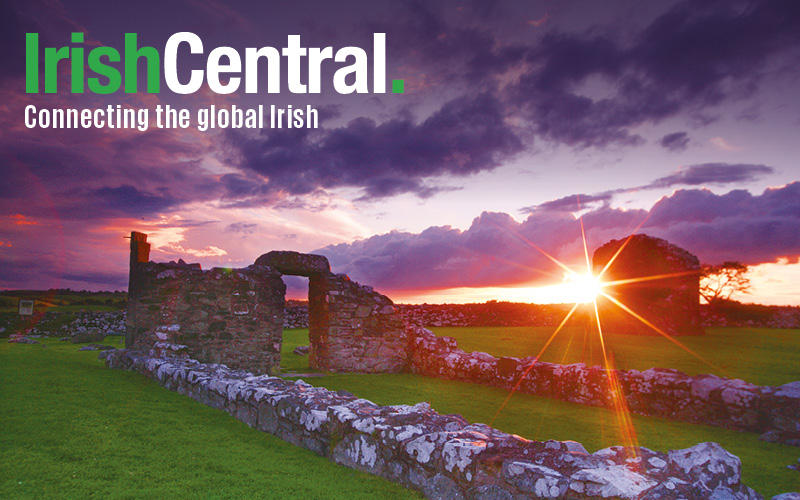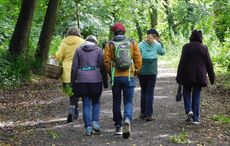Belfast - One should always expect big changes in over a 30-year span, but since my last visit to Belfast was in the first decade of The Troubles, a visit two weekends ago proved to be a stark contrast in many ways.
Of course, I was aware of the massive changes brought about by the Good Friday Agreement in bringing stability to six Ulster counties still part of the United Kingdom, where it seems that only borders of the mind and memory hold fast along with the pound sterling.
Yes, the Peace Wall still exists in West Belfast sadly separating the Falls and the Shankill Roads at night and weekends awaiting some “Berlin Wall-type” symbolic breakthrough. But the sense of community and a broader Irishness came through as a sign of the great strides that have taken place up here.
Driving from Dublin to Belfast via motorway is getting shorter all the time and as I did so a week before Good Friday I really couldn’t have envisioned what I would see upon arrival.
A friend in Foras na Gaeilge, Eamonn O hArgain told me of a launch that day of a new weekly Irish newspaper, Gaelsceal, both in Dublin and also in Belfast. I opted to attend the one in Belfast since I was going there to see a concert on Saturday evening of some musician friends anyway.
The launch of the new paper, with a $2.2 million contract from Foras na Gaeilge behind it, by Torann na dTonn Teoranta (the Sound of the Waves) a partnership between the Connacht Tribune and Eo Teilifis, indicated more than just the Irish fascination with the printed word and higher newspaper readership numbers than other western countries.
It was also meant to encourage and signify a new bilingualism for the Irish language, particularly among a younger generation that didn’t attach stigmas to it, and those who saw it as a way to build community both on the island of Ireland and beyond.
Contributors come from the Irish-speaking Gaelthacts and around the world, and the maiden issue had a column from Irish Voice publisher Niall O’Dowd.
The Belfast launch was inside a multi-functional Irish language center on the Falls Road known as the Culturlann McAdam O Fiaich, formerly the Broadway Presbyterian Church now named in honor of 19th century Protestant Roibeard McAdam, and Cardinal Tomas O Fiaich who were two prominent pioneering Ulster Gaelgoieri.
The Culturlann (www.culturlann.com) boasts a bookshop, café, theater and gallery and houses Radio Failte, an Irish-language station in Belfast.
The 32-page full color tabloid newspaper will circulate in 32 counties (£1.50) every Friday (available via the web at www.gaelsceal.ie two days later) and will attempt to fill the void of the daily La Nua that closed in 2008 followed soon after by the weekly Foinse in mid-2009, victims of the recession rather than disinterest.
The primary purpose of my Belfast visit was to take in one of the shows of an intriguing traditional music tour dubbed “Buttons, Barrels and Bows” as part of the Moving On Music Festival 2010.
Trad artists Micheal O’Raghallaigh (concertina), Catherine McEvoy (flute) and Caoimhin O’Raghallaigh (fiddles, viola) did a short five-gig tour with the Belfast show at An Droichead on Saturday, March 27.
The trio, consummate artists on their own and in other collaborations, came together for a Music Network tour around the Republic a couple of years ago and found a great simpatico in their musical styles.
An Droichead (the Bridge) in South Belfast alongside the Lagan River
near Queens University was another purpose-built community center that housed a Gaelscoil for children, and Irish language classes and programs for adults.
At first glance the upstairs room did not look like a suitable venue for a concert with its long rectangular tables dominating the room like a school lunchroom, and single chairs all around the peripheral walls.
As the audiences cascaded in waves up to showtime, a palpable sense of community was forming. Rarely have I seen such attentiveness at a concert, especially a BYOB affair.
The compere or hostess, Lynette Fay of BBC Ulster’s Irish language program Blas, was a charming and a well-informed bilingual emcee, even giving out football scores along the way.
The main reason for the sterling behavior round the room was the music on the bill that night. A local Belfast group Pigeontop (Shane McAleer, Darragh Murphy, Kevin Sweeney and Ryan O’Donnell) opened up smartly with a crowd-pleasing set, no doubt honed by the ample practice the night before in Madden’s Bar in an upstairs corner booth.
The main act of O’Raghallaigh, McEvoy and O’Raghallaigh (no relation) held no prisoners either from the first notes as they were also debuting a new CD entitled Comb Your Hair and Curl It that was featured throughout their two sets.
Each of these musicians, Micheal on the concertina, Catherine on the flute and Caoimhin on the fiddle and hardanger fiddle, are top-tier on their respective instruments.
Micheal and Catherine have logged time in uptempo outfits like ceili bands without losing any feel for the music, so they remain as full of expression and interpretation as any great individual player. Caoimhin’s reputation is one of invention and innovation in interpreting traditional music.
Without the benefit -- or in this instance the disadvantage -- of rhythm backers or accompanists, it was fascinating to listen to the arrangements they put together so thoughtfully and artfully.
The music on the night was of fireside tempo, no hurried pace or misplaced frenzy but rather exquisite playing where the notes and musicianship were happily married.
The audience was spellbound by the interplay of the concertina flute and the alternating fiddles at Caoimhin’s command all night, and in no hurry to leave either. An added bonus at the interval was a song As Gaeilge from the current male Corn Ui Riada champion, Doimnic Mac Giolla Bhríde from na Doirí Beaga, Co. Donegal.
The banner at the doorway greeted visitors to An Droichead as the Bridge to Irish, the Arts and Culture, and no truer words were ever writ because it had the Cead Mile Failte of not too long ago where Irish hospitality was known world wide alongside a pride for the native culture.
Visitors to Belfast should check out www.androichead.com, or the An Droichead Feile at the end of August. You will be amazed at how living a language Irish is and why its future success lies with those with those who embrace its commonality across all borders while holding onto to what makes it truly Irish.
Masters Gather at IAC
THE third edition of the innovative Masters in Collaboration series at New York City’s Irish Arts Center will take place next week, matching together the scintillating duet of fiddler Martin Hayes and guitarist Dennis Cahill, a well-known traditional music act with the classical violinist, Gregory Harrington.
It is sure to be a thought-provoking and stimulating event that can be all too rare in the music scene these days, with serious music fans the ultimate beneficiaries.
Hayes, born in Maghera, in East Clare, is one of Ireland’s finest traditional fiddle players whose playing of traditional music goes beyond definition and the usual boundaries associated with it.
Cahill, a Chicago native with Kerry roots, has played with Hayes around the world. Their concerts have much in common with classical music recitals because the audience often listens with the head as much as with the heart.
Harrington, an acclaimed classical violinist from Dublin and resident in New York, also is well-traveled and should make for a fascinating partner in the week-long exploration of traditional music meets classical music.
On Tuesday, April 13 from 7-9 p.m. Hayes and Cahill will offer master classes in fiddle and guitar at the Irish Arts Center (551 West 51st Street).
On Wednesday, April 14 at 8 p.m. series creator and peerless interviewer Dr. Mick Moloney will moderate a discussion with Hayes, Cahill and Harrington on their respective careers, musical influences and experience.
Two shows at week’s end will feature the artists and their musical minds at work and play after a week’s delving into their fertile home turf repertoires.
For reservations contact Rachel Gilkey at 212-757-3318, ext. 209, or visit www.irishartscenter.org.




Comments